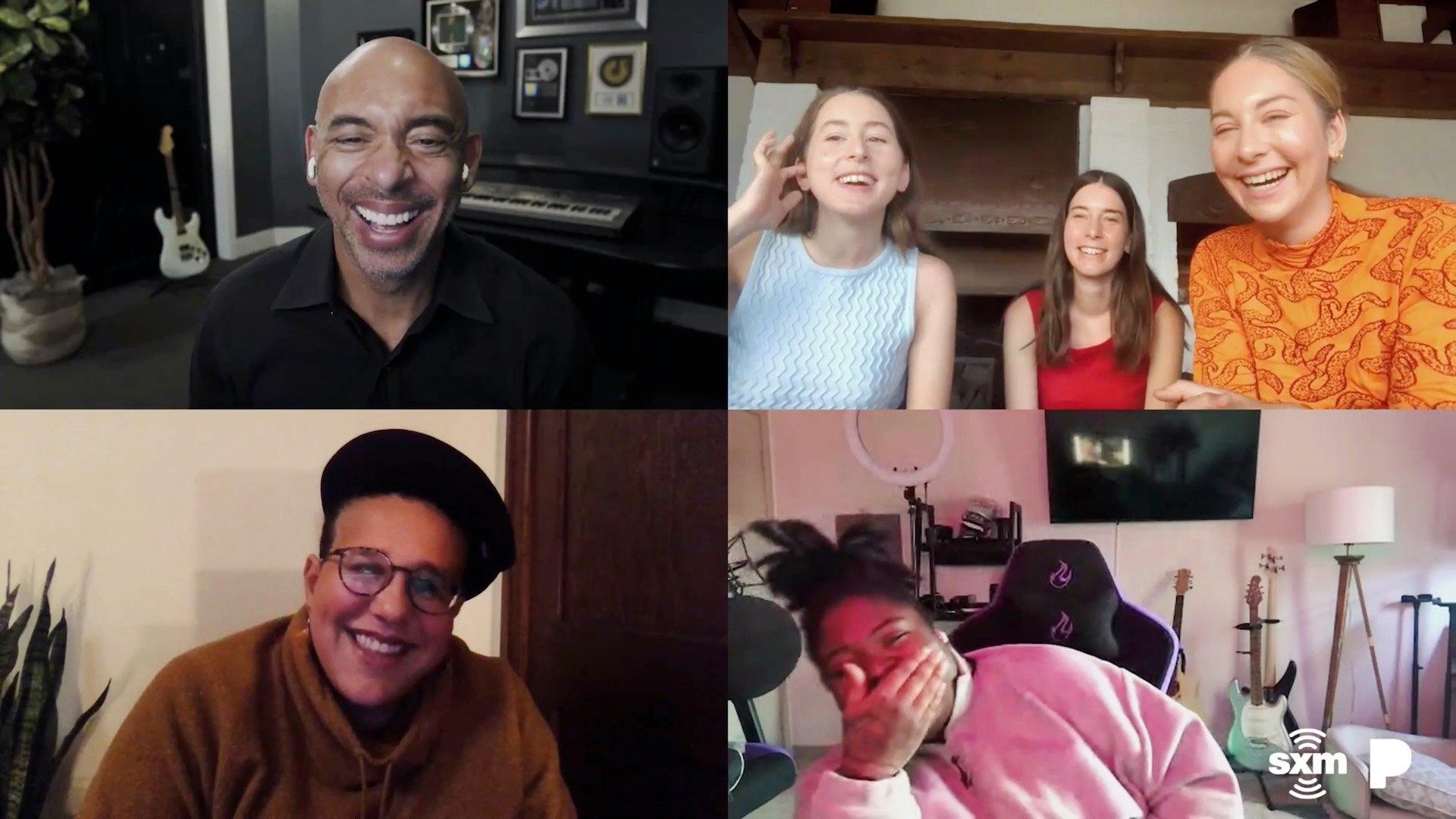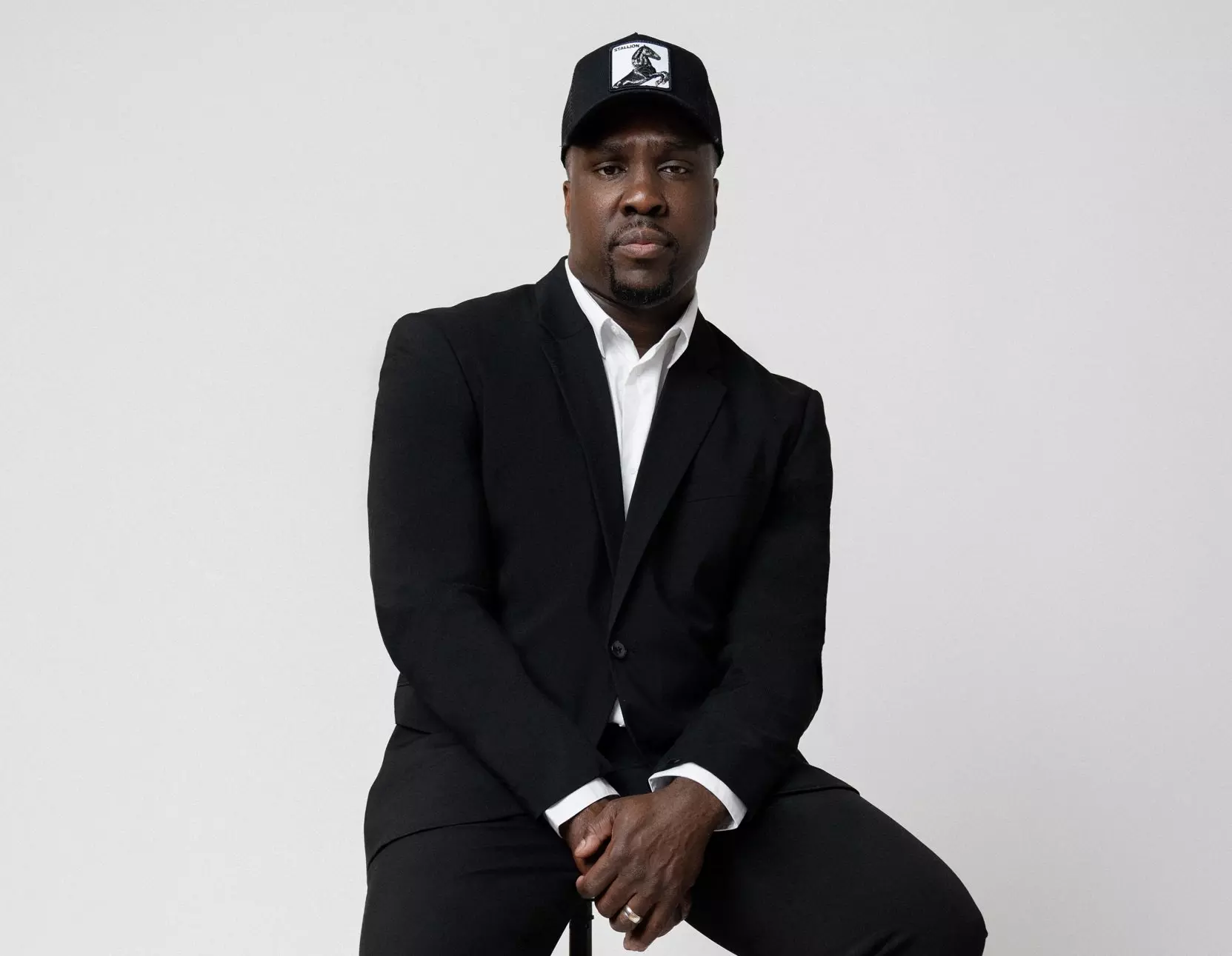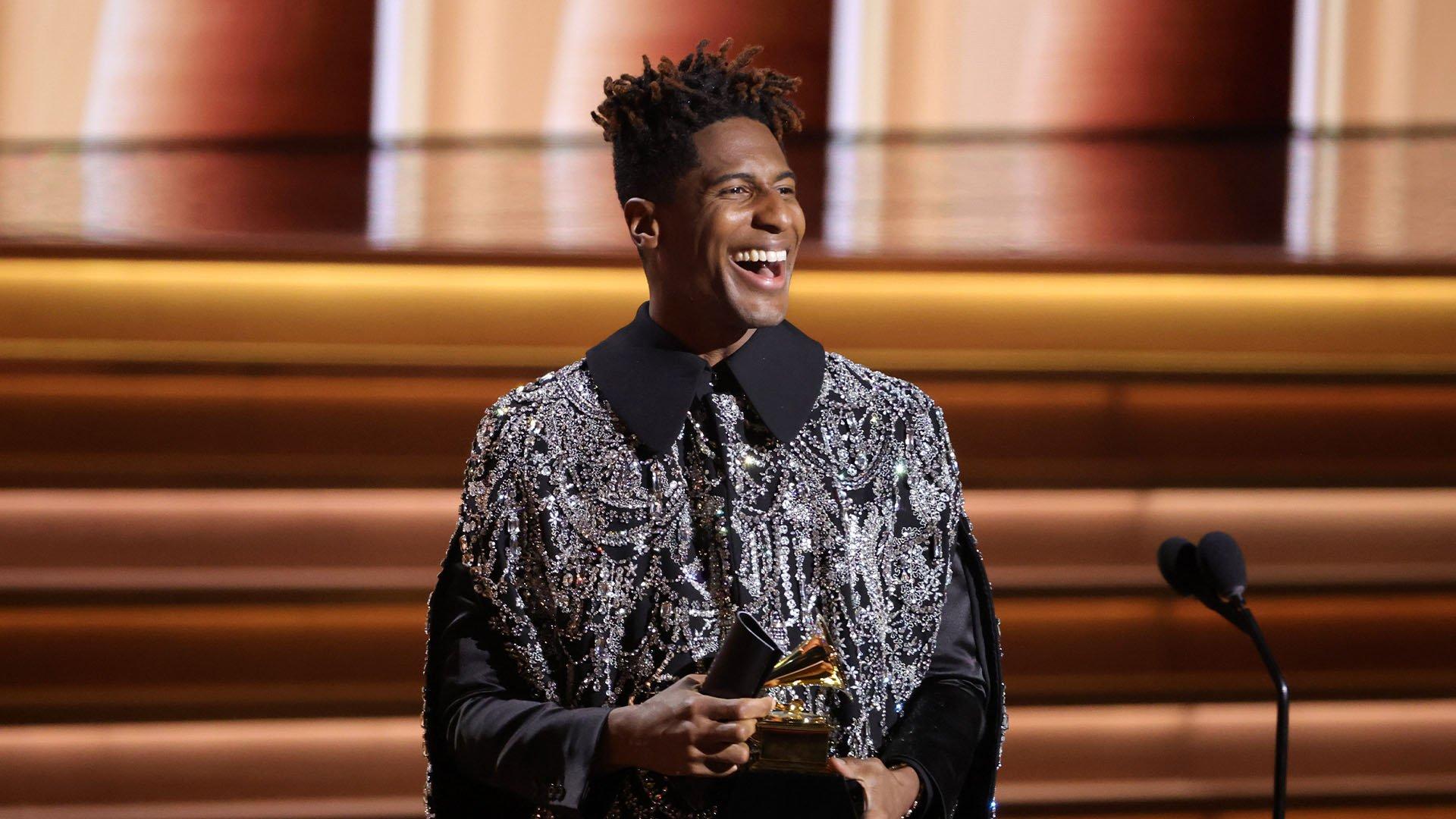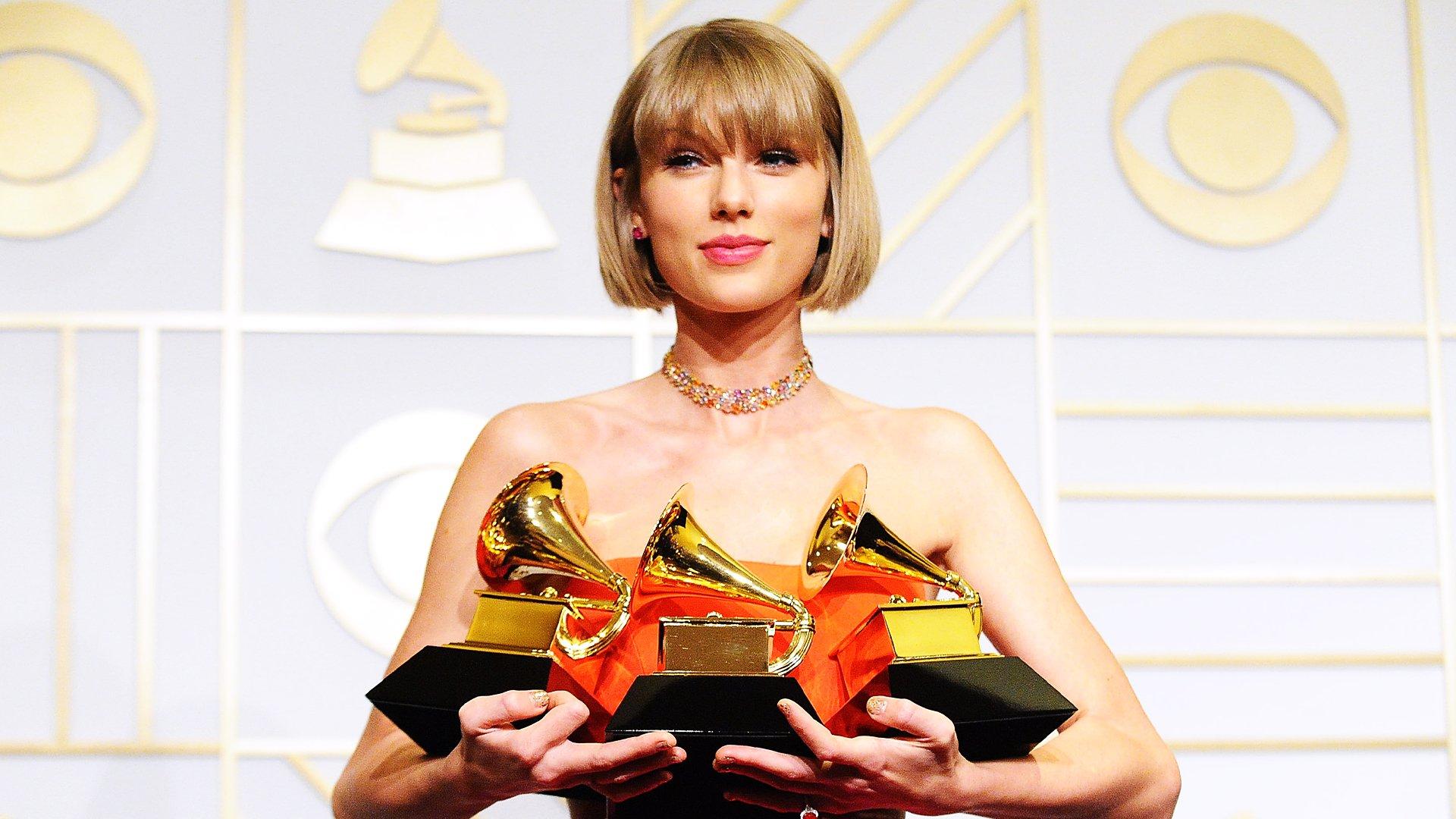Photo: Theo Wargo/Getty Images for Pandora

news
HAIM, Brittany Howard and CHIKA Deliver Dynamic Performances and Tease A Collaboration During Pandora LIVE's Countdown To The GRAMMY Awards
The GRAMMY nominees sang songs off their latest projects, spoke on their processes and bonded over their shared eagerness to get back on stage
Between the nominees and performers for the 63rd GRAMMY Awards, female artists are an undeniable force to be reckoned with this year. Pandora LIVE's Countdown To The GRAMMY Awards on Thursday, March 12, was further proof of the abundant girl power, honoring GRAMMY nominees CHIKA, Brittany Howard and HAIM. Hosted by Chair & Interim President/CEO of the Recording Academy Harvey Mason jr., the virtual GRAMMY Week event featured dynamic performances and an insightful interview with all of the above women.
Before the performances began, everyone spoke on the releases that resulted in their GRAMMY nominations. CHIKA remarkably earned her first nod following her debut project with Warner Records, Industry Games (the rapper/singer is nominated for Best New Artist). Perhaps even more notable, the album arrived just as COVID-19 hit last year. "I haven't gotten the normal experience that an artist has once they put out their first project to see the reaction," she said. "So, to get this acknowledgment in such a high regard off of my first year out is incredible to me, but also still something I'm processing."
Howard touched on the doubts that arise when making a new record but ultimately had one way to describe her five nominations: "I'm shooketh." HAIM, who told Howard they can relate to the uncertainty artists often feel, discussed how the process of their album Women In Music Pt. III—up for Album of the Year—aligns with the isolation the world has seen in the pandemic.
<style>.embed-container { position: relative; padding-bottom: 56.25%; height: 0; overflow: hidden; max-width: 100%; } .embed-container iframe, .embed-container object, .embed-container embed { position: absolute; top: 0; left: 0; width: 100%; height: 100%; }</style><div class='embed-container'><iframe src='https://www.youtube.com/embed/LUlE8j6j5bE' frameborder='0' allowfullscreen></iframe></div>
"When we wrote this record in particular, we were all collectively in a depressive spiral," Este Haim, the group's bassist, said. "I think we all felt really isolated, so a lot of the subject matter on Women in Music Pt. III is about feeling alone. And then, lo and behold, we put out this record in the middle of a pandemic, where everyone collectively feels some version of loneliness. We're just really happy that it resonated with people during this really insane, crazy time in our lives. We just want to make people not feel so lonely."
The women bonded over several things in their conversation, with the most significant commonality being how much they all miss touring. "That's what we're so excited about," Danielle Haim said. "People are going to want to see live music so bad that I hope we're going to just be playing our asses off." Echoed Este, "It's going to be the Roaring '20s 100 years later."
"Music is such an energy exchange that making it is ... if you're doing it right, you feel exhausted afterward," CHIKA added. "The way that humans typically recharge is being in an electrifying room with people who genuinely support you … But there is no recharge unless you've begun to pivot and adapt to the circumstances that we're all under right now."
It was easy to see that all three artists are itching to get back in front of an audience, as they each gave their performances their all. CHIKA was up first, delivering a captivating medley of her tracks "My Power" and "On My Way." She closed with a sultry song titled "FWB," the lead single from her latest EP, Once Upon a Time, which arrived just hours after the performance.
Another topic everyone agreed upon was their desire not to be defined by one genre. Howard's GRAMMY nods particularly prove that she really is genreless: Her album Jaime spawned nominations in the Rock, Alternative, R&B, and American Roots Music categories.
"I love everything, I like everything," Howard explained of her boundary-pushing sound. "I find life to be really suspenseful. Experiences, emotions, colors—it's just musical to me. All of that belongs in my music. I'm just putting out what I'm experiencing. The fact that I'm nominated across all of these genres makes perfect sense to me. That's how I absorb sounds, whatever it is."
Howard flexed her versatility with her four-song performance, playing Jaime tracks "Stay High," "Baby," "Goat Head," and "13th Century Metal." Her stage setup transported viewers to the venue, as she had a full backing band and a draped curtain backdrop illuminated by blue and pink lighting. The bridge of "13th Century Metal" felt like Howard was leading a congregation as she chanted, "We are all brothers and sisters!" and tromped around the stage with strobe lights flashing around her.
HAIM closed out the show with four effervescent tunes. Although they opted not to play their Best Rock Performance honoree "The Steps," the sisters did stick to tracks from Women In Music Pt. III, including "Summer Girl," "Gasoline" and "I've Been Down." For the final song, HAIM's lead singer Danielle tackled "Man From the Magazine" solo with an acoustic guitar, making for a powerful finish to the female-dominated event.
Before signing off, the women teased that this might not be the last time fans see them all in one place. "I'll produce beats for you, CHIKA," Howard offered, to which Haim's Este yelled, "I'll play bass!" CHIKA excitedly urged, "We need to trade contact info." If the night's performances were any indication, that would be one heck of a collaboration.

Photo: Aitor Laspiur
interview
Omar Apollo Embraces Heartbreak And Enters His "Zaddy" Era On 'God Said No'
Alongside producer Teo Halm, Omar Apollo discusses creating 'God Said No' in London, the role of poetry in the writing process, and eventually finding comfort in the record's "proof of pain."
"Honestly, I feel like a zaddy," Omar Apollo says with a roguish grin, "because I'm 6'5" so, like, you can run up in my arms and stay there, you know what I mean?"
As a bonafide R&B sensation and one of the internet’s favorite boyfriends, Apollo is likely used to the labels, attention and online swooning that come with modern fame. But in this instance, there’s a valid reason for asking about his particular brand of "zaddyhood": he’s been turned into a Bratz doll.
In the middle of June, the popular toy company blasted a video to its nearly 5 million social media followers showing off the singer as a real-life Bratz Boy — the plastic version draped in a long fur coat (shirtless, naturally), with a blinged-out cross necklace and matching silver earrings as he belts out his 2023 single "3 Boys" from a smoke-covered stage.
The video, which was captioned "Zaddy coded," promptly went viral, helped along by an amused Apollo reposting the clip to his own Instagram Story. "It was so funny," he adds. "And it's so accurate; that's literally how my shows go. It made me look so glamorous, I loved it."
The unexpected viral moment came with rather auspicious timing, considering Apollo is prepping for the release of his hotly anticipated sophomore album. God Said No arrives June 28 via Warner Records.
In fact, the star is so busy with the roll-out that, on the afternoon of our interview, he’s FaceTiming from the back of a car. The day prior, he’d filmed the music video for "Done With You," the album’s next single. Now he’s headed to the airport to jet off to Paris, where he’ll be photographed front row at the LOEWE SS25 men’s runway show in between Sabrina Carpenter and Mustafa — the latter of whom is one of the few collaborators featured on God Said No.
Apollo’s trusted co-writer and producer, Teo Halm, is also joining the conversation from his home studio in L.A. In between amassing credits for Beyoncé (The Lion King: The Gift), Rosalía and J Balvin (the Latin GRAMMY-winning "Con Altura"), SZA ("Notice Me" and "Open Arms" featuring Travis Scott) and others, the 25-year-old virtuoso behind the boards had teamed up with Apollo on multiple occasions. Notably, the two collabed on "Evergreen (You Didn’t Deserve Me At All)," which helped Apollo score his nomination for Best New Artist at the 2023 GRAMMYs.
In the wake of that triumph, Apollo doubled down on their creative chemistry by asking Halm to executive produce God Said No. (The producer is also quick to second his pal’s magnetic mystique: "Don't get it twisted, he's zaddy, for sure.")
Apollo bares his soul like never before across the album’s 14 tracks, as he processes the bitter end of a two-year relationship with an unnamed paramour. The resulting portrait of heartbreak is a new level of emotional exposure for a singer already known for his unguarded vulnerability and naked candor. (He commissioned artist Doron Langberg to paint a revealing portrait of him for the cover of his 2023 EP Live For Me, and unapologetically included a painting of his erect penis as the back cover of the vinyl release.)
On lead single "Spite," he’s pulled between longing and resentment in the wake of the break-up over a bouncing guitar riff. Second single "Dispose of Me" finds Apollo heartsick and feeling abandoned as he laments, "It don’t matter if it’s 25 years, 25 months/ It don’t matter if it’s 25 days, it was real love/ We got too much history/ So don’t just dispose of me."
Elsewhere, the singer offers the stunning admission that "I would’ve married you" on album cut "Life’s Unfair." Then, on the very next song — the bumping, braggadocious "Against Me" — Apollo grapples with the reality that he’s been permanently altered by the love affair while on the prowl for a rebound. "I cannot act like I’m average/ You know that I am the baddest bitch," he proclaims on the opening verse, only to later admit, "I’ve changed so much, but have you heard?/ I can’t move how I used to."
More Omar Apollo News & Videos

Omar Apollo Embraces Heartbreak And Enters His "Zaddy" Era On 'God Said No'

How Danna Paola Created 'CHILDSTAR' By Deconstructing Herself

On Omar Apollo's New EP 'Live for Me,’ Limitless Experimentation Created Catharsis

Listen To GRAMMY.com's LGBTQIA+ Pride Month 2023 Playlist Featuring Demi Lovato, Sam Smith, Kim Petras, Frank Ocean, Omar Apollo & More

Omar Apollo On “Evergreen,” Growth & Longing
Given the personal subject matter filling God Said No — not to mention the amount of acclaim he earned with Ivory — it would be understandable if Apollo felt a degree of pressure or anxiety when it came to crafting his sophomore studio set. But according to the singer, that was entirely not the case.
"I feel like I wouldn’t be able to make art if I felt pressure," he says. "Why would I be nervous about going back and making more music? If anything, I'm more excited and my mind is opened up in a whole other way and I've learned so much."
In order to throw his entire focus into the album’s creation, Apollo invited Halm to join him in London. The duo set up shop in the famous Abbey Road Studios, where the singer often spent 12- to 13-hour days attempting to exorcize his heartbreak fueled by a steady stream of Aperol spritzes and cigarettes.
The change of scenery infused the music with new sonic possibilities, like the kinetic synths and pulsating bass line that set flight to "Less of You." Apollo and Halm agree that the single was directly inspired by London’s unique energy.
"It's so funny because we were out there in London, but we weren't poppin' out at all," the Halm says. "Our London scene was really just, like, studio, food. Omar was a frickin' beast. He was hitting the gym every day…. But it was more like feeding off the culture on a day-to-day basis. Like, literally just on the walk to the studio or something as simple as getting a little coffee. I don't think that song would've happened in L.A."
Poetry played a surprisingly vital role in the album’s creation as well, with Apollo littering the studio with collections by "all of the greats," including the likes of Ocean Vuong, Victoria Chang, Philip Larkin, Alan Ginsberg, Mary Oliver and more.
"Could you imagine making films, but never watching a film?" the singer posits, turning his appreciation for the written art form into a metaphor about cinema. "Imagine if I never saw [films by] the greats, the beauty of words and language, and how it's manipulated and how it flows. So I was so inspired."
Perhaps a natural result of consuming so much poetic prose, Apollo was also led to experiment with his own writing style. While on a day trip with his parents to the Palace of Versailles, he wrote a poem that ultimately became the soaring album highlight "Plane Trees," which sends the singer’s voice to new, shiver-inducing heights.
"I'd been telling Teo that I wanted to challenge myself vocally and do a power ballad," he says. "But it wasn't coming and we had attempted those songs before. And I was exhausted with writing about love; I was so sick of it. I was like, Argh, I don't want to write anymore songs with this person in my mind."
Instead, the GRAMMY nominee sat on the palace grounds with his parents, listening to his mom tell stories about her childhood spent in Mexico. He challenged himself to write about the majestic plane tree they were sitting under in order to capture the special moment.
Back at the studio, Apollo’s dad asked Halm to simply "make a beat" and, soon enough, the singer was setting his poem to music. (Later, Mustafa’s hushed coda perfected the song’s denouement as the final piece of the puzzle.) And if Apollo’s dad is at least partially responsible for how "Plane Trees" turned out, his mom can take some credit for a different song on the album — that’s her voice, recorded beneath the same plane tree, on the outro of delicate closer "Glow."
Both the artist and the producer ward off any lingering expectations that a happy ending will arrive by the time "Glow" fades to black, however. "The music that we make walks a tightrope of balancing beauty and tragedy," Halm says. "It's always got this optimism in it, but it's never just, like, one-stop shop happy. It's always got this inevitable pain that just life has.
"You know, even if maybe there wasn't peace in the end for Omar, or if that wasn't his full journey with getting through that pain, I think a lot of people are dealing with broken hearts who it really is going to help," the producer continues. "I can only just hope that the music imparts leaving people with hope."
Apollo agrees that God Said No contains a "hopeful thread," even if his perspective on the project remains achingly visceral. Did making the album help heal his broken heart? "No," he says with a sad smile on his face. "But it is proof of pain. And it’s a beautiful thing that is immortalized now, forever.
"One day, I can look back at it and be like, Wow, what a beautiful thing I experienced. But yeah, no, it didn't help me," he says with a laugh.
Latest News & Exclusive Videos

8 Ways Sade's 'Diamond Life' Album Redefined '80s Music & Influenced Culture

Katelyn Tarver's "Everyday Is A Winding Road"

On New Album 'Big Ideas,' Remi Wolf Delivers Musical Poetry In Motion

Meet Derrick Hodge, The Composer Orchestrating Hip-Hop's Symphony

Behind Ryan Tedder's Hits: Stories From The Studio With OneRepublic, Beyoncé, Taylor Swift & More

Photo: Jathan Campbell
list
How Much Is A GRAMMY Worth? 7 Facts To Know About The GRAMMY Award Trophy
Here are seven facts to know about the actual cost and worth of a GRAMMY trophy, presented once a year by the Recording Academy at the GRAMMY Awards.
Since 1959, the GRAMMY Award has been music’s most coveted honor. Each year at the annual GRAMMY Awards, GRAMMY-winning and -nominated artists are recognized for their musical excellence by their peers. Their lives are forever changed — so are their career trajectories. And when you have questions about the GRAMMYs, we have answers.
Here are seven facts to know about the value of the GRAMMY trophy.
How Much Does A GRAMMY Trophy Cost To Make?
The cost to produce a GRAMMY Award trophy, including labor and materials, is nearly $800. Bob Graves, who cast the original GRAMMY mold inside his garage in 1958, passed on his legacy to John Billings, his neighbor, in 1983. Billings, also known as "The GRAMMY Man," designed the current model in use, which debuted in 1991.
How Long Does It Take To Make A GRAMMY Trophy?
Billings and his crew work on making GRAMMY trophies throughout the year. Each GRAMMY is handmade, and each GRAMMY Award trophy takes 15 hours to produce.
Where Are The GRAMMY Trophies Made?
While Los Angeles is the headquarters of the Recording Academy and the GRAMMYs, and regularly the home of the annual GRAMMY Awards, GRAMMY trophies are produced at Billings Artworks in Ridgway, Colorado, about 800 miles away from L.A.
Is The GRAMMY Award Made Of Real Gold?
GRAMMY Awards are made of a trademarked alloy called "Grammium" — a secret zinc alloy — and are plated with 24-karat gold.
How Many GRAMMY Trophies Are Made Per Year?
Approximately 600-800 GRAMMY Award trophies are produced per year. This includes both GRAMMY Awards and Latin GRAMMY Awards for the two Academies; the number of GRAMMYs manufactured each year always depends on the number of winners and Categories we award across both award shows.
Fun fact: The two GRAMMY trophies have different-colored bases. The GRAMMY Award has a black base, while the Latin GRAMMY Award has a burgundy base.
Photos: Gabriel Bouys/AFP via Getty Images; Frederick M. Brown/Getty Images
How Much Does A GRAMMY Weigh?
The GRAMMY trophy weighs approximately 5 pounds. The trophy's height is 9-and-a-half inches. The trophy's width is nearly 6 inches by 6 inches.
What Is The True Value Of A GRAMMY?
Winning a GRAMMY, and even just being nominated for a GRAMMY, has an immeasurable positive impact on the nominated and winning artists. It opens up new career avenues, builds global awareness of artists, and ultimately solidifies a creator’s place in history. Since the GRAMMY Award is the only peer-voted award in music, this means artists are recognized, awarded and celebrated by those in their fields and industries, ultimately making the value of a GRAMMY truly priceless and immeasurable.
In an interview featured in the 2024 GRAMMYs program book, two-time GRAMMY winner Lauren Daigle spoke of the value and impact of a GRAMMY Award. "Time has passed since I got my [first] GRAMMYs, but the rooms that I am now able to sit in, with some of the most incredible writers, producers and performers on the planet, is truly the greatest gift of all."
"Once you have that credential, it's a different certification. It definitely holds weight," two-time GRAMMY winner Tariq "Black Thought" Trotter of the Roots added. "It's a huge stamp as far as branding, businesswise, achievement-wise and in every regard. What the GRAMMY means to people, fans and artists is ever-evolving."
As Billboard explains, artists will often see significant boosts in album sales and streaming numbers after winning a GRAMMY or performing on the GRAMMY stage. This is known as the "GRAMMY Effect," an industry phenomenon in which a GRAMMY accolade directly influences the music biz and the wider popular culture.
For new artists in particular, the "GRAMMY Effect" has immensely helped rising creators reach new professional heights. Samara Joy, who won the GRAMMY for Best New Artist at the 2023 GRAMMYs, saw a 989% boost in sales and a 670% increase in on-demand streams for her album Linger Awhile, which won the GRAMMY for Best Jazz Vocal Album that same night. H.E.R., a former Best New Artist nominee, saw a massive 6,771% increase in song sales for her hit “I Can’t Breathe” on the day it won the GRAMMY for Song Of The Year at the 2021 GRAMMYs, compared to the day before, Rolling Stone reports.
Throughout the decades, past Best New Artist winners have continued to dominate the music industry and charts since taking home the GRAMMY gold — and continue to do so to this day. Recently, Best New Artist winners dominated the music industry and charts in 2023: Billie Eilish (2020 winner) sold 2 million equivalent album units, Olivia Rodrigo (2022 winner) sold 2.1 million equivalent album units, and Adele (2009 winner) sold 1.3 million equivalent album units. Elsewhere, past Best New Artist winners have gone on to star in major Hollywood blockbusters (Dua Lipa); headline arena tours and sign major brand deals (Megan Thee Stallion); become LGBTIA+ icons (Sam Smith); and reach multiplatinum status (John Legend).
Most recently, several winners, nominees and performers at the 2024 GRAMMYs saw significant bumps in U.S. streams and sales: Tracy Chapman's classic, GRAMMY-winning single "Fast Car," which she performed alongside Luke Combs, returned to the Billboard Hot 100 chart for the first time since 1988, when the song was originally released, according to Billboard. Fellow icon Joni Mitchell saw her ‘60s classic “Both Sides, Now,” hit the top 10 on the Digital Song Sales chart, Billboard reports.
In addition to financial gains, artists also experience significant professional wins as a result of their GRAMMY accolades. For instance, after she won the GRAMMY for Best Reggae Album for Rapture at the 2020 GRAMMYs, Koffee signed a U.S. record deal; after his first GRAMMYs in 2014, Kendrick Lamar saw a 349% increase in his Instagram following, Billboard reports.
Visit our interactive GRAMMY Awards Journey page to learn more about the GRAMMY Awards and the voting process behind the annual ceremony.

Photo: Matt Winkelmeyer/Getty Images
video
GRAMMY Rewind: Watch Jon Batiste’s Encouraging Speech For His 2022 Album Of The Year Win For 'We Are'
Jon Batiste accepts the Album Of The Year award for We Are, a win that he dedicated to "real artists, real musicians."
Jon Batiste walked into the 2022 GRAMMYs with a whopping 11 nominations, making him the most recognized artist of the evening. By the end of the night, he received five GRAMMYs for Best American Roots Performance, Best American Roots Song, Best Score Soundtrack For Visual Media, Best Music Video, and the highly coveted Album Of The Year.
In this episode of GRAMMY Rewind, watch Batiste take the stage to accept the award for Album Of The Year for his sixth studio album, We Are
Batiste began his praises by acknowledging God: "I just put my head down and work on the craft every day. I love music, he said. "I've been playing since I was a little boy. It's more than entertainment for me — it's a spiritual practice." He also thanked the "many people that went into making this album," including his grandfather, nephew, father, and executive producer, Ryan Lynn.
"This [award] is for real artists, real musicians. Let's just keep going. Be you! That's it. I love you even if I don't know you," Batiste cheered.
Press play on the video above to hear Jon Batiste's complete acceptance speech and check back to GRAMMY.com for more new episodes of GRAMMY Rewind.

Photo: Jason LaVeris/FilmMagic/Getty Images
video
GRAMMY Rewind: Watch Taylor Swift Become The First Woman To Win Album Of The Year Twice
Celebrate the release of ‘The Tortured Poets Department’ by revisiting the night Taylor Swift made history as the first woman to win Album Of The Year twice at the 2016 GRAMMYs.
At the 2024 GRAMMYs, Taylor Swift became the artist with the most Album Of The Year awards in GRAMMY history with four total wins. But her first record-breaking AOTY moment traces back eight years ago, when she became the first woman to win the category twice.
In this episode of GRAMMY Rewind, relive the moment she won the historic golden gramophone for her iconic fifth studio album, 1989, at the 2016 GRAMMYs.
“I want to thank the fans for the last 10 years,” Swift beamed, praising her loyal fanbase, the Swifties. She later acknowledged the Recording Academy for “this unbelievable honor” and the project’s main producer, Max Martin, who “deserved to be up there for 25 years.”
Before she left the stage, she offered an inspiring message to aspiring female musicians in light of her groundbreaking win. “To all the young women, there are going to be people along the way who try to undercut your success or take credit for your accomplishments or your fame,” she explained. “But if you just focus on the work and don’t let those people sidetrack you, someday, when you get where you’re going, you’ll look around and know that it was you and the people who love you who put you there. That will be the greatest feeling in the world.”
Check out Taylor Swift’s complete acceptance speech for her second Album Of The Year win, before diving into the release of The Tortured Poets Department, and check back to GRAMMY.com for more new episodes of GRAMMY Rewind.
